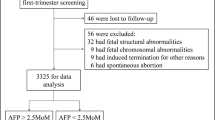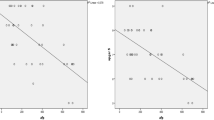Abstract
Objective
To determine the relationship between adverse pregnancy outcomes and maternal serum alpha-fetoprotein (MSAFP) levels.
Materials and methods
A retrospective cohort study was conducted on consecutive singleton pregnancies, screened for fetal Down syndrome, in the northern part of Thailand. The prospective database of our fetal Down screening program was assessed to recruit all consecutive records. Pregnancies with medical complication and fetal abnormality were excluded. The recruited women were categorized into three groups: normal (≥0.76 to ≤2.0 MoM), low (<0.76 MoM) and high (>2.0 MoM) MSAFP levels.
Results
Of 7,110 screened women, 5,486 met inclusion criteria, including 240; 5,016 and 230 in the group of high, normal and low MSAFP levels, respectively. The rates of preterm birth, pregnancy-induced hypertension (PIH), fetal growth restriction (FGR), fetal death, low birth weight (LBW) and low APGAR scores were significantly higher in women with high MSAFP levels (11.7 vs. 6.6 %, 7.5 vs. 3.3 %, 7.5 vs. 3.3 %, 2.1 vs. 0.3 %, 15.8 vs. 6.7 %, and 2.9 vs. 0.5 % respectively), with relative risk of 1.76, 2.28, 2.27, 7.46, 2.35 and 6.09, respectively. The rates of preterm birth, FGR and LBW were significantly lower in low MSAFP levels with relative risk of 0.39, 0.26 and 0.26, respectively, whereas the rates of PIH and fetal death and low Apgar scores were not significantly different.
Conclusions
Pregnant women with high MSAFP levels had an increased risk of poor pregnancy outcomes, while those with low MSAFP levels had a significantly lower risk of such outcomes.

Similar content being viewed by others
Abbreviations
- MSAFP:
-
Maternal serum alpha-fetoprotein
- PIH:
-
Pregnancy-induced hypertension
- FGR:
-
Fetal growth restriction
- LBW:
-
Low birth weight
References
Mizejewski GJ (2007) Physiology of alpha-fetoprotein as a biomarker for perinatal distress: relevance to adverse pregnancy outcome. Exp Biol Med (Maywood) 232:993–1004
Morris RK, Cnossen JS, Langejans M et al (2008) Serum screening with Down’s syndrome markers to predict pre-eclampsia and small for gestational age: systematic review and meta-analysis. BMC Pregnancy Childbirth 8:33
Mizejewski GJ (2004) Biological roles of alpha-fetoprotein during pregnancy and perinatal development. Exp Biol Med (Maywood) 229:439–463
Hay DM, Forrester PI, Hancock RL, Lorscheider FL (1976) Maternal serum alpha-fetoprotein in normal pregnancy. Br J Obstet Gynaecol 83:534–538
Merkatz IR, Nitowsky HM, Macri JN, Johnson WE (1984) An association between low maternal serum alpha-fetoprotein and fetal chromosomal abnormalities. Am J Obstet Gynecol 148:886–894
Simpson JL, Palomaki GE, Mercer B et al (1995) Associations between adverse perinatal outcome and serially obtained second- and third-trimester maternal serum alpha-fetoprotein measurements. Am J Obstet Gynecol 173:1742–1748
Waller DK, Lustig LS, Cunningham GC, Feuchtbaum LB, Hook EB (1996) The association between maternal serum alpha-fetoprotein and preterm birth, small for gestational age infants, preeclampsia, and placental complications. Obstet Gynecol 88:816–822
Spencer K (2000) Second-trimester prenatal screening for down syndrome and the relationship of maternal serum biochemical markers to pregnancy complications with adverse outcome. Prenat Diagn 20:652–656
Wanapirak C, Sirichotiyakul S, Luewan S et al (2012) Different median levels of serum triple markers in the second trimester of pregnancy in a Thai Ethnic Group. J Obstet Gynaecol Res 38:686–691
Jauniaux E, Gulbis B, Tunkel S, Ramsay B, Campbell S, Meuris S (1996) Maternal serum testing for alpha-fetoprotein and human chorionic gonadotropin in high-risk pregnancies. Prenat Diagn 16:1129–1135
Milunsky A, Jick SS, Bruell CL et al (1989) Predictive values, relative risks, and overall benefits of high and low maternal serum alpha-fetoprotein screening in singleton pregnancies: new epidemiologic data. Am J Obstet Gynecol 161:291–297
Raty R, Koskinen P, Alanen A, Irjala K, Matinlauri I, Ekblad U (1999) Prediction of pre-eclampsia with maternal mid-trimester total renin, inhibin A, AFP and free beta-hCG levels. Prenat Diagn 19:122–127
Wald NJ, Morris JK, Ibison J, Wu T, George LM (2006) Screening in early pregnancy for pre-eclampsia using Down syndrome quadruple test markers. Prenat Diagn 26:559–564
Dugoff L, Hobbins JC, Malone FD et al (2005) Quad screen as a predictor of adverse pregnancy outcome. Obstet Gynecol 106:260–267
Capeless EL, Kelleher PC, Walters CP (1992) Elevated maternal serum alpha-fetoprotein levels and maternal risk factors. Their association with pregnancy complications. J Reprod Med 37:257–260
Morssink LP, Heringa MP, Beekhuis JR, De Wolf BT, Mantingh A (1997) The association between hypertensive disorders of pregnancy and abnormal second-trimester maternal serum levels of hCG and alpha-fetoprotein. Obstet Gynecol 89:666–670
Cho S, Durfee KK, Keel BA, Parks LH (1997) Perinatal outcomes in a prospective matched pair study of pregnancy and unexplained elevated or low AFP screening. J Perinat Med 25:476–483
Pouta AM, Hartikainen AL, Vuolteenaho OJ, Ruokonen AO, Laatikainen TJ (1998) Midtrimester N-terminal proatrial natriuretic peptide, free beta hCG, and alpha-fetoprotein in predicting preeclampsia. Obstet Gynecol 91:940–944
Hershkovitz R, de Swiet M, Kingdom J (2005) Mid-trimester placentation assessment in high-risk pregnancies using maternal serum screening and uterine artery Doppler. Hypertens Pregnancy 24:273–280
Brazerol WF, Grover S, Donnenfeld AE (1994) Unexplained elevated maternal serum alpha-fetoprotein levels and perinatal outcome in an urban clinic population. Am J Obstet Gynecol 171:1030–1035
Society for Maternal-Fetal Medicine Publications Committee (2012) Progesterone and preterm birth prevention: translating clinical trials data into clinical practice. Am J Obstet Gynecol 206:376–386
Burton BK (1988) Outcome of pregnancy in patients with unexplained elevated or low levels of maternal serum alpha-fetoprotein. Obstet Gynecol 72:709–713
Krause TG, Christens P, Wohlfahrt J, Lei U, Westergaard T, Norgaard-Pedersen B et al (2001) Second-trimester maternal serum alpha-fetoprotein and risk of adverse pregnancy outcome. Obstet Gynecol 97:277–282
Baschat AA, Harman CR, Farid G, Chodirker BN, Evans JA (2002) Very low second-trimester maternal serum alpha-fetoprotein: association with high birth weight. Obstet Gynecol 99:531–536
Acknowledgments
The Faculty of Medicine Research Fund of Chiang Mai University, and the National Research University Project under Thailand’s Office of the Higher Education Commission.
Conflict of interest
None.
Author information
Authors and Affiliations
Corresponding author
Rights and permissions
About this article
Cite this article
Puntachai, P., Wanapirak, C., Sirichotiyakul, S. et al. Associations between pregnancy outcomes and unexplained high and low maternal serum alpha-fetoprotein levels. Arch Gynecol Obstet 292, 81–85 (2015). https://doi.org/10.1007/s00404-014-3606-9
Received:
Accepted:
Published:
Issue Date:
DOI: https://doi.org/10.1007/s00404-014-3606-9




